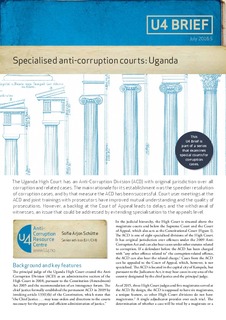| dc.contributor.author | Schütte, Sofie Arjon | |
| dc.date.accessioned | 2018-01-04T08:23:35Z | |
| dc.date.available | 2018-01-04T08:23:35Z | |
| dc.date.issued | 2016-07-01 | |
| dc.identifier | oai:www.cmi.no:5887 | |
| dc.identifier.citation | Bergen: Chr. Michelsen Institute (U4 Brief 2016:5) 5 p | |
| dc.identifier.uri | http://hdl.handle.net/11250/2475430 | |
| dc.description.abstract | The Uganda High Court has an Anti-Corruption Division (ACD) with original jurisdiction over all corruption and related cases. The main rationale for its establishment was the speedier resolution of corruption cases, and by that measure the ACD has been successful. Court user meetings at the ACD and joint trainings with prosecutors have improved mutual understanding and the quality of prosecutions. However, a backlog at the Court of Appeal leads to delays and the withdrawal of witnesses, an issue that could be addressed by extending specialisation to the appeals level.
This brief is part of a series of case studies on special anti-corruption courts. The case studies discuss the courts? design and whether they have lived up to the expectations that led to their establishment. We draw lessons for their particular country context, but also specialisation of courts more generally.
These case studies will be complemented by a forthcoming issue paper discussing and comparing specialised anti-corruption courts around the world. | |
| dc.language.iso | eng | |
| dc.relation | U4 Brief | |
| dc.relation | 2016:5 | |
| dc.relation.ispartof | U4 Brief | |
| dc.relation.ispartofseries | U4 Brief 2016:5 | |
| dc.relation.uri | https://www.cmi.no/publications/5887-specialised-anti-corruption-courts-uganda | |
| dc.subject | Anti-Corruption | |
| dc.subject | Courts | |
| dc.subject | Special Criminal Court | |
| dc.subject | Specialised Anti-Corruption Bodies | |
| dc.subject | Justice | |
| dc.subject | Uganda | |
| dc.title | Specialised anti-corruption courts: Uganda | |
| dc.type | Report | |
